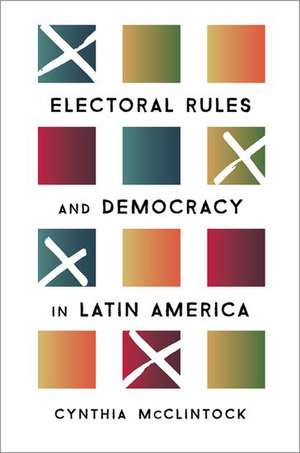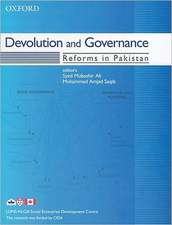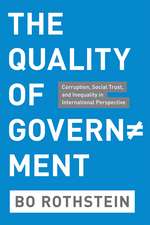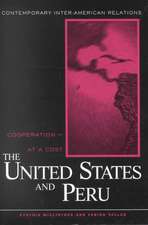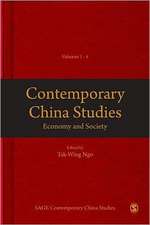Electoral Rules and Democracy in Latin America
Autor Cynthia McClintocken Limba Engleză Paperback – 10 mai 2018
| Toate formatele și edițiile | Preț | Express |
|---|---|---|
| Paperback (1) | 297.22 lei 31-37 zile | |
| Oxford University Press – 10 mai 2018 | 297.22 lei 31-37 zile | |
| Hardback (1) | 702.45 lei 31-37 zile | |
| Oxford University Press – 10 mai 2018 | 702.45 lei 31-37 zile |
Preț: 297.22 lei
Preț vechi: 336.58 lei
-12% Nou
Puncte Express: 446
Preț estimativ în valută:
56.88€ • 58.76$ • 47.34£
56.88€ • 58.76$ • 47.34£
Carte tipărită la comandă
Livrare economică 14-20 martie
Preluare comenzi: 021 569.72.76
Specificații
ISBN-13: 9780190879761
ISBN-10: 0190879769
Pagini: 336
Dimensiuni: 231 x 155 x 23 mm
Greutate: 0.48 kg
Editura: Oxford University Press
Colecția OUP USA
Locul publicării:New York, United States
ISBN-10: 0190879769
Pagini: 336
Dimensiuni: 231 x 155 x 23 mm
Greutate: 0.48 kg
Editura: Oxford University Press
Colecția OUP USA
Locul publicării:New York, United States
Recenzii
This is a very important and highly original contribution to the literature on presidentialism and electoral institutions, by a distinguished scholar of Latin American politics. Questioning prevailing academic wisdom, and systematically weighing the evidence from Latin America with multiple methods, Cynthia McClintock shows that runoff election rules are clearly superior to the plurality system for electing presidents. Runoff elections do in fact produce what could be logically predicted: more legitimate and ideologically moderate presidents, and a higher quality and vitality of democracy. This powerful finding should significantly shape not only academic analysis but also future thinking about institutional design and reform.
This book makes an important, compelling argument: Latin America's democracies have benefitted from shifting toward electing their president employing run-off elections if no candidate initially receives a majority, instead of relying on single-round plurality elections. The author carefully explains why, relying on a judicious combination of methods, including statistical analysis, interviews and comparative case material, without ignoring the potential negative implications and trade-offs inherent in all electoral rules.
McClintock's impressive book is the product of many years of scrupulous research and careful analysis. Drawing on vast empirical evidence in Latin America and challenging much conventional thinking, she cogently argues that a runoff is superior to a plurality rule in presidential elections. Her findings have important implications for the quality and legitimacy of democracy in Latin America and more widely. McClintock's valuable contribution will influence current debates among scholars and policymakers about the merits of electoral systems.
In this exhaustively researched and well-written book, Cynthia McClintock argues persuasively that the ways that presidents are elected in Latin America - whether by a plurality of votes or in a run off - deeply impacts regime legitimacy, moderation, and the inclusiveness of party systems. Her broadly comparative and empirical study offers fresh insight into the ways that electoral design enhances or impedes democratic outcomes.
In this richly documented study, McClintock finds that democracies where presidential candidates need only a plurality of the vote to triumph are in serious danger of losing their popular legitimacy and eventually falling victim to tyranny.
"An excellent addition to our overall understanding of democratization and democratic decline in Latin America."-Leslie E. Anderson,Perspectives on Politics
This book makes an important, compelling argument: Latin America's democracies have benefitted from shifting toward electing their president employing run-off elections if no candidate initially receives a majority, instead of relying on single-round plurality elections. The author carefully explains why, relying on a judicious combination of methods, including statistical analysis, interviews and comparative case material, without ignoring the potential negative implications and trade-offs inherent in all electoral rules.
McClintock's impressive book is the product of many years of scrupulous research and careful analysis. Drawing on vast empirical evidence in Latin America and challenging much conventional thinking, she cogently argues that a runoff is superior to a plurality rule in presidential elections. Her findings have important implications for the quality and legitimacy of democracy in Latin America and more widely. McClintock's valuable contribution will influence current debates among scholars and policymakers about the merits of electoral systems.
In this exhaustively researched and well-written book, Cynthia McClintock argues persuasively that the ways that presidents are elected in Latin America - whether by a plurality of votes or in a run off - deeply impacts regime legitimacy, moderation, and the inclusiveness of party systems. Her broadly comparative and empirical study offers fresh insight into the ways that electoral design enhances or impedes democratic outcomes.
In this richly documented study, McClintock finds that democracies where presidential candidates need only a plurality of the vote to triumph are in serious danger of losing their popular legitimacy and eventually falling victim to tyranny.
"An excellent addition to our overall understanding of democratization and democratic decline in Latin America."-Leslie E. Anderson,Perspectives on Politics
Notă biografică
Cynthia McClintock is Professor of Political Science and International Affairs at George Washington University.
